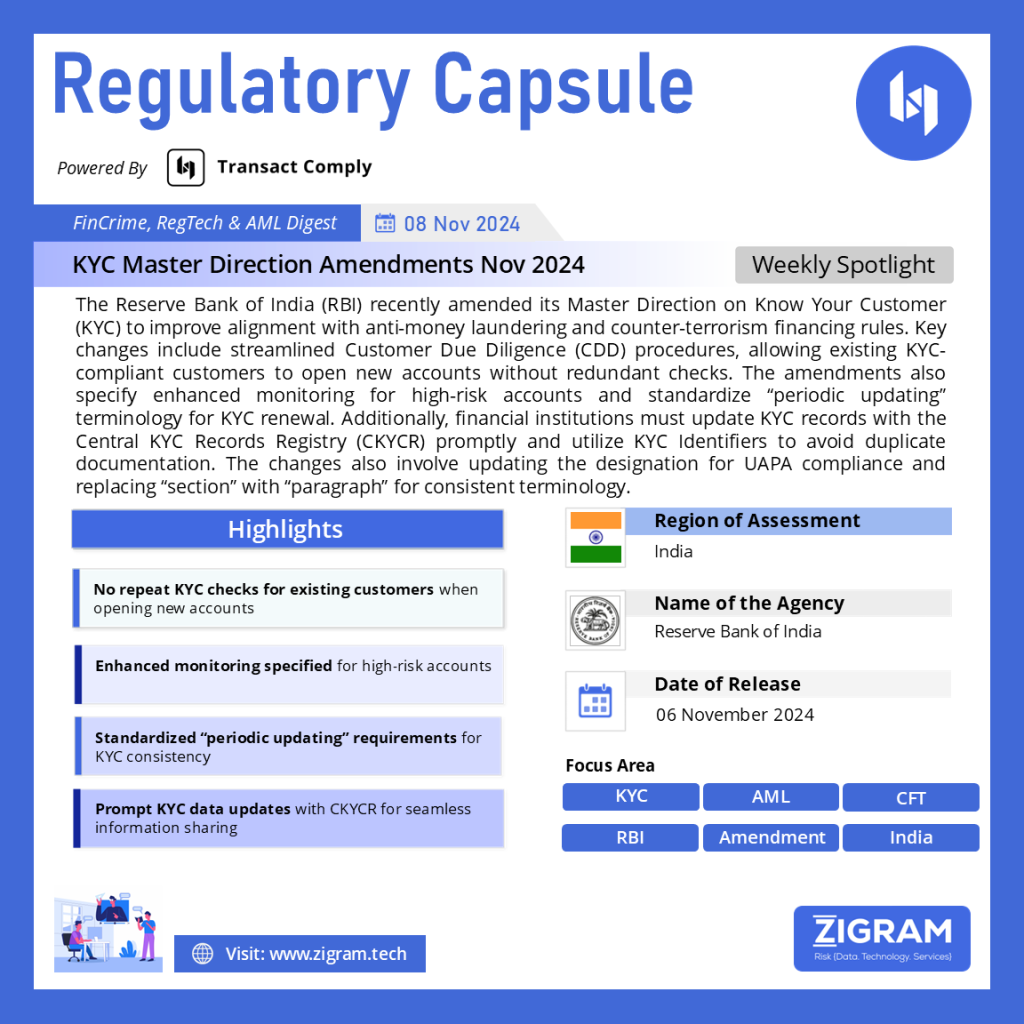Regulation Name: RBI KYC Master Direction
Publishing Date: 06 November 2024
Region: India
Agencies: Reserve Bank of India
On November 6, 2024, the Reserve Bank of India (RBI) issued a notification amending its Master Direction on Know Your Customer (KYC) norms, aligning with recent updates in anti-money laundering and counter-terrorism financing regulations. These revisions reflect changes made in the Prevention of Money Laundering (Maintenance of Records) Rules, 2005, as well as updates under the Unlawful Activities (Prevention) Act, 1967 (UAPA). The key amendments aim to refine Customer Due Diligence (CDD) procedures, improve KYC data handling, and clarify certain operational procedures for banks and financial institutions, or Regulated Entities (REs).
Key Amendments to the Master Direction on KYC
The amendments to the Master Direction on KYC provide clarifications and procedural updates for REs in India to enhance KYC and CDD processes. The following are the main changes:
Customer Acceptance Policy – Paragraph 10
RBI has clarified that Customer Due Diligence (CDD) procedures are to be conducted at the Unified Customer Identification Code (UCIC) level. This allows existing KYC-compliant customers of a financial institution to open new accounts or avail additional services without undergoing a new CDD exercise, as long as their identity has already been verified. This revision aims to simplify procedures for both customers and institutions by minimizing repetitive checks.
Enhanced Monitoring of High-Risk Accounts – Paragraph 37
A minor but important shift was made in Paragraph 37, where the “Explanation” stating that “High-risk accounts have to be subjected to more intensified monitoring” was explicitly extended to apply to specific sub-paragraphs (a) and (b). This adjustment aims to ensure a uniform understanding and application of enhanced monitoring protocols for high-risk accounts, reinforcing RBI’s commitment to risk-based scrutiny.
KYC Updation Requirements – Paragraph 38
To clarify requirements for ongoing KYC verification, the term ‘updation’ has been uniformly updated to ‘periodic updation’ in Paragraph 38. This amendment in sub-paragraph (a) clauses (ii) and (iv), and sub-paragraph (c) clauses (iii) and (iv) emphasizes the need for regular, scheduled KYC updates for existing customers, thereby strengthening record accuracy and compliance.
Central KYC Records Registry (CKYCR) Compliance – Paragraph 56
The amendments under Paragraph 56 address requirements for maintaining and updating KYC data in the Central KYC Records Registry (CKYCR). REs are now required to upload or update KYC records of individual and legal entity accounts opened before specified dates during each periodic KYC update or when new information is received. Additionally, any updated information from customers must be submitted to the CKYCR within seven days, or as specified by the government. CKYCR will subsequently notify all REs associated with the customer regarding updates to the customer’s KYC records, ensuring real-time sharing of accurate information across institutions.
Paragraph 56 also mandates that REs use the KYC Identifier to retrieve KYC records from CKYCR when establishing new account relationships or verifying identity, thus eliminating the need for customers to resubmit existing KYC documents unless:
– There is a change in the customer’s information,
– The KYC record from CKYCR is incomplete or outdated,
– Document validity has expired,
– Further verification or enhanced due diligence is deemed necessary.
Designation Change for UAPA Compliance – Annex II
In line with a corrigendum dated April 22, 2024, from the Government of India, the designation of the Central Nodal Officer for UAPA has been modified from “Additional Secretary” to “Joint Secretary.” This change ensures that REs are aware of the correct authority for compliance with UAPA-related requirements.
Terminology Updates in KYC Documentation
In an effort to enhance clarity, the RBI has standardized the language in the Master Direction, replacing the term “section” with “paragraph” in all internal references. This update aims to ensure consistent terminology throughout the document.
Implications for Financial Institutions
These amendments aim to streamline KYC processes, reduce redundancies, and strengthen monitoring for high-risk accounts. For financial institutions, the changes emphasize:
– Reduced KYC Duplication: With the ability to use existing KYC records for customers wishing to open new accounts, institutions can reduce the administrative burden on both staff and clients, allowing for quicker service provision and improved customer satisfaction.
– Enhanced Monitoring of High-Risk Accounts: By making the intensified monitoring requirement explicit for high-risk accounts, the RBI reinforces the importance of vigilance against suspicious activities in such accounts.
– Clarity in Periodic KYC Updation: Explicit instructions on “periodic updation” allow institutions to better organize and comply with scheduled KYC updates, enhancing data accuracy and compliance.
– Efficient KYC Data Sharing through CKYCR: Incremental uploading and real-time sharing of KYC data through CKYCR simplifies data management for REs, supports comprehensive customer risk assessment, and aids in regulatory compliance.
These amendments reflect RBI’s ongoing commitment to aligning India’s financial sector with global standards for anti-money laundering and counter-terrorism financing. By simplifying KYC processes, reinforcing high-risk monitoring, and ensuring real-time KYC data sharing, RBI seeks to bolster the resilience and integrity of India’s financial institutions. These measures are expected to benefit both customers and financial institutions, fostering a more secure and streamlined banking environment.
Read the details here.
Read about the product: Transact Comply
Empower your organization with ZIGRAM’s integrated RegTech solutions – Book a Demo
- #RBIGuidelines
- #KYCUpdate
- #FinancialCompliance
- #AML
- #CustomerDueDiligence
- #HighRiskMonitoring
- #CKYCR
- #BankingRegulations
- #RBI
